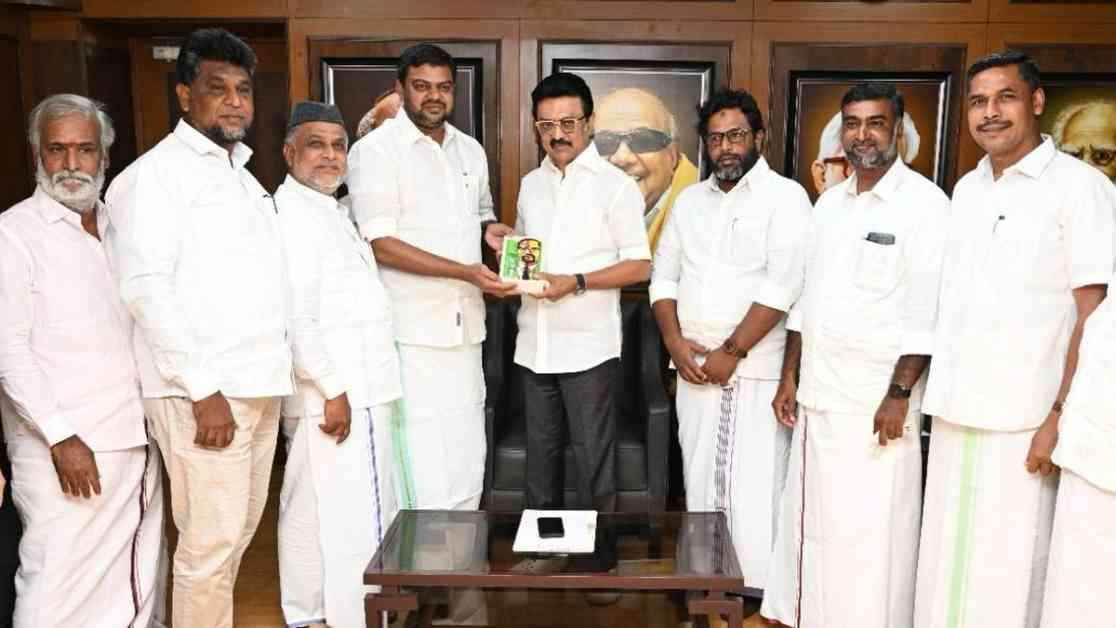A prominent figure in the Social Democratic Party of India (SDPI), Nellai Mubarak, recently paid a visit to the DMK president and Tamil Nadu Chief Minister M.K. Stalin at the party head office in Chennai on Friday. The purpose of the meeting was to express gratitude for the Tamil Nadu government’s actions against the Union government’s Waqf (Amendment) Act. This encounter has sparked speculation regarding the future of the SDPI within the AIADMK-led alliance.
Meeting of Minds: SDPI’s Nellai Mubarak Meets DMK Chief Stalin
In a display of political camaraderie, Nellai Mubarak, the State unit president of SDPI, engaged in discussions with CM Stalin, touching upon the sensitive topic of the Waqf legislation. Mubarak emphasized that the Act goes against the principles of the Constitution, secularism, and the rights of minorities, prompting the SDPI to organize protests nationwide. He stressed the importance of unity among all democratic forces in opposing this legislation, highlighting the efforts of the Tamil Nadu Chief Minister in moving a resolution against the Act in the Assembly. The solidarity displayed by DMK MPs in voting against the legislation further underscored the stance taken by non-BJP parties in the state.
During the interaction with the media following the meeting, Mubarak refrained from committing to any future political alliances, particularly with regards to the AIADMK potentially aligning with the BJP. He maintained that the primary objective of the visit was to convey appreciation to CM Stalin for his stance on the Waqf issue and the recent Supreme Court ruling against the Tamil Nadu Governor. Mubarak’s praise for the latter decision as “historic” reflects the significance of judicial interventions in the political landscape.
Political Landscape: The Intersection of Alliances and Ideologies
The nuanced dynamics of political affiliations and ideological alignments come to the forefront through interactions such as these, where parties navigate complex relationships while remaining steadfast in their core beliefs. As the SDPI navigates the delicate balance between expressing gratitude for governmental actions and preserving its independent voice, the implications of potential electoral alliances loom large. The evolving landscape of Tamil Nadu politics underscores the importance of strategic decisions and principled stands in shaping the trajectory of the state’s governance.
As Mubarak’s statements hint at a cautious approach towards political developments, the SDPI’s role in the larger political ecosystem remains subject to speculation. The interplay between regional dynamics, national policies, and grassroots activism underscores the multifaceted nature of political engagement in a diverse and dynamic state like Tamil Nadu. By acknowledging the efforts of the Tamil Nadu Chief Minister and advocating for unity against contentious legislation, the SDPI positions itself as a conscientious player in the realm of state politics.
In conclusion, the meeting between Nellai Mubarak of the SDPI and CM Stalin of the DMK serves as a microcosm of the larger political landscape in Tamil Nadu, where alliances, ideologies, and governance intersect to shape the future of the state. As discussions around the Waqf legislation and electoral alliances unfold, the role of parties like the SDPI in advocating for constitutional values and minority rights remains pivotal in steering the course of political discourse in the region.














